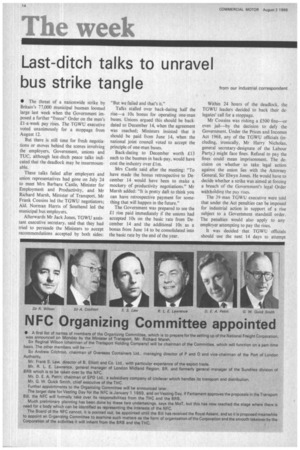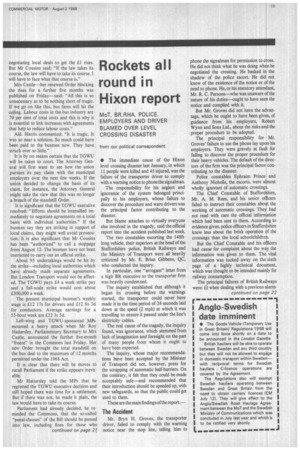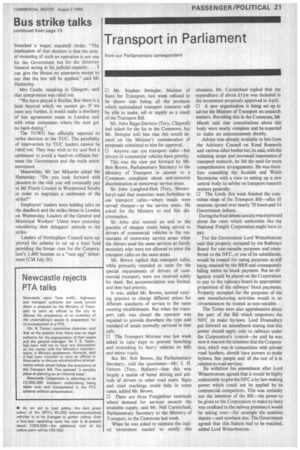Last-ditch talks to unravel
Page 16

Page 17

Page 23

If you've noticed an error in this article please click here to report it so we can fix it.
bus strike tangle from our industrial correspondent
• The threat of a nationwide strike by Britain's 77,000 municipal busmen loomed large last week when the Government imposed a further "freeze" Order on the men's El-a-week pay rises. The TGWU executive voted unanimously for a stoppage from August 12.
But there is still time for fresh negotiations or moves behind the scenes involving the employers, Government, unions and TUC, although last-ditch peace talks indicated that the deadlock may be insurmountable.
These talks failed after employers and union representatives had gone on July 24 to meet Mrs Barbara Castle, Minister for Employment and Productivity, and Mr Richard Marsh, Minister of Transport. Mr Frank Cousins led the TGWU negotiators; Aid. Norman Harris of Southend led the municipal bus employers.
Afterwards Mr Jack Jones, TGWU assistant executive secretary, said that they had tried to persuade the Ministers to accept recommendations accepted by both sides: "But we failed and that's it."
Talks stalled over back-dating half the rise—a 1 Os bonus for operating one-man buses. Unions argued this should be backdated to December 14, when the agreement was reached; Ministers insisted that it should be paid from June 14, when the national joint council voted to accept the principle of one-man buses.
Back-dating to December worth £13 each to the busmen in back-pay, would have cost the industry over Elm.
Mrs Castle said after the meeting: "To have made the bonus retrospective to December 14 would have been to make a mockery of productivity negotiations." Mr Marsh added: "It is pretty daft to think you can have retrospective payment for something that will happen in the future."
The Government was prepared to see the El rise paid immediately if the unions had accepted lOs on the basic rate from December 14 and the additional lOs as a bonus from June 14 to be consolidated into the basic rate by the end of the year.
Within 24 hours of the deadlock, the TGWU leaders decided to back their delegates' call for a stoppage.
Mr Cousins was risking a £500 fine—or even jail—by the decision to defy the Government. Under the Prices and Incomes Act 1968, any of the TGWU officials (including, ironically, Mr Harry Nicholas, general secretary-designate of the Labour • Party,) might face fines. Refusal to pay the fines could mean imprisonment. The decision on whether to take legal action against the union lies with the Attorney General, Sir Elwyn Jones. He would have to decide whether a strike was aimed at forcing a breach of the Government's legal Order withholding the pay rises.
The 39-man TGWU executive were told that under the Act penalties can be imposed for industrial action in support of a rise subject to a Government standstill order. The penalties would also apply to any employer attempting to pay the rises.
It was decided that TGWU officials should use the next 14 days to attempt negotiating local deals to get the £1 rises. But Mr Cousins said: "If the law takes its course, the law will have to take its course. I will have to face what that course is."
Mrs Castle—her renewed Order blocking the rises for a further five months was published on Friday—said: "AU this is so unnecessary as to be nothing short of tragic. If we go on like this, bus fares will hit the ceiling. Labour costs in the,bus industry are 70 per cent of total costs and this is why it is essential to link increases with agreements that help to reduce labour costs."
Ald. Harris commented: "It is tragic. It was so near a solution. So much could have been paid to the busmen now. They have struck over so little."
It is by no means certain that the TGWU will be taken to court. The Attorney General will first want to see how the union pursues its pay claim with the municipal employers over the next few weeks. If the unicl decided to change the basis of its claim, for instance, the Attorney General might take the view that this was no longer a breach of the standstill Order.
It is significant that the TGWU executive resolved: "Efforts should be intensified immediately to negotiate agreements on a local basis with individual authorities." If the busmen say they are striking in support of local claims, they might well avoid prosecution. It is also significant that Mr Cousins has been "authorizedto call a stoppage from August 12. The busmen have not been instructed to carry out an official strike.
About 95 undertakings would be hit by the strike—including local authorities which have already made separate agreements. But London Transport would not be affected. The TGWU pays £4 a week strike pay and a full-scale strike would cost about £300,000 a week.
The present municipal busmen's weekly wage is £12 17s for drivers and £12 8s 3d for conductors. Average earnings for a 55-hbur week are £22 3s 5d.
Left-wing and TGWU-sponsored MPs mounted a heavy attack when Mr Roy Hattersley, Parliamentary Secretary to Mrs Castle, announced the further five-month "freeze" in the Commons last Friday. Her new Order brought the total standstill on the bus deal to the maximum of 12 months permitted under the 1968 Act.
It is clear that there will be moves to recall Parliament if the strike appears inevitable.
Mr Hattersley told the MPs that he regretted the TGWU executive decision and still hoped there was time for a settlement. But if there was not, he made it plain, the law would have to take its course.
Parliament had already decided, he reminded the Commons, that the so-called "penal-clauses" of the Bill should be passed into law, including fines for those who
breached a wages standstill Order. "The implication of that decision is that the actual mounting of such an operation is not one for the Government but for the Attorney General acting in his judicial capacity . . . I can give the House no assurance except to say that the law will be applied," said Mr lattersley.
Mrs Castle, speaking in Glasgow, said that compromise was ruled out.
"We have played it flexible. But there is a limit beyond which we cannot go. If we went any further, it would make a mockery of bus agreements made in London and with other companies where the men got no back-dating."
The TGWU has officially reported its strike decision to the TUC. The possibility of intervention by TUC leaders cannot be ruled out. They may wish to try and find a settlement to avoid a head-on collision between the Government and the trade union movement.
Meanwhile, Mr Ian Mikardo asked Mr Hattersley: "Do you look forward with pleasure to the visit you will eventually pay to Mr Frank Cousins in Wormwood Scrubs in order to negotiate a settlement of the strike?"
Employers' leaders were holding talks on the deadlock and the strike threat in London on Wednesday. Leaders of the General and Municipal Workers' Union were yesterday considering their delegates' attitude to the strike.
Leaders of Nottingham Council have approved the scheme to set up a trust fund providing the frozen rises for the Corporation's 1,400 busmen as a "nest egg" investment (CM July 26).




































































































